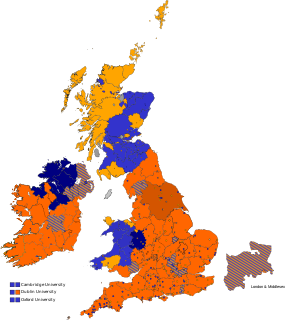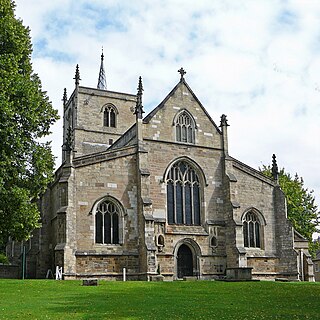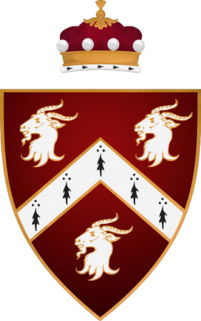Related Research Articles

Yorkshire was a constituency of the House of Commons of the Parliament of England from 1290, then of the Parliament of Great Britain from 1707 to 1800 and of the Parliament of the United Kingdom from 1801 to 1832. It was represented by two Members of Parliament, traditionally known as Knights of the Shire, until 1826, when the county benefited from the disfranchisement of Grampound by taking an additional two members.
Knaresborough was a parliamentary constituency which returned two Members of Parliament (MPs) to the House of Commons of the Parliament of the United Kingdom until 1868, and then one MP until its abolition in 1885.

Sir Henry Slingsby of Scriven, 1st Baronet, 14 January 1602 – 8 June 1658, was an English landowner, politician and soldier who sat in the House of Commons at various times between 1625 and 1642. He supported the Royalist cause during the Wars of the Three Kingdoms, and was executed in 1658 for his part in a conspiracy to restore Charles II.
Sir Thomas Slingsby, 2nd Baronet, of Scriven in Yorkshire, was an English landowner and Member of Parliament.

Slingsby Bethel (1617–1697) was a Member of Parliament with republican sympathies, during the period of the English Civil War.
Sir Richard Hutton, the younger was a Yorkshire landowner and Member of Parliament for Knaresborough who lost his life in the English Civil War.

There have been four baronetcies created for members of the Slingsby family who settled at Scriven Hall, Scriven, Knaresborough, Yorkshire in the 14th century.
Henry Benson of Knaresborough, Yorkshire was an English politician who sat in the House of Commons variously between 1626 and 1641.
Sir Hugh Bethell was an English politician who sat in the House of Commons at various times between 1654 and 1679.

Sir William Slingsby, was an English soldier, who is often erroneously noted as the discoverer of the first spa water well in Harrogate, North Yorkshire.
Sir Edward Poole was an English politician who sat in the House of Commons at various times between 1640 and 1673.
Henry Arthington was an English politician who sat in the House of Commons at various times between 1646 and 1660.
Sir Thomas Ingram was an English politician who sat in the House of Commons in two periods between 1640 and 1672. He supported the Royalist cause in the English Civil War.
Sir Henry Cholmley (1609–1666) was an English politician who sat in the House of Commons at various times between 1641 and 1666. He supported the Parliamentary cause in the English Civil War.
Sir Henry Slingsby was an English landowner and politician who sat in the House of Commons between 1601 and 1624.
Sir Philip Howard was an English soldier and politician who sat in the House of Commons between 1659 and 1679.
James Darcy was an English politician who sat in the House of Commons in 1660.
Sir Edward Walpole was an English politician and knight who sat in the House of Commons from 1660 to 1668.

Sir George Marwood was a Yorkshire landowner who served as the High Sheriff of Yorkshire in 1651 and was later elected as the Member of Parliament for Northallerton in 1660.

Bilton Hall is a Grade II listed large country house near Harrogate, North Yorkshire. It was historically the home of the prominent Stockdale family, of which three Knaresborough MPs were members.
References
This article relies largely or entirely on a single source .(July 2014) |